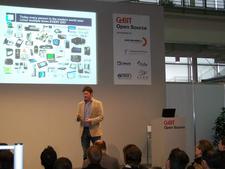CeBIT 2010: Linux Successes, Challenges
At the Open Source Forum of CeBIT 2010, the Linux Foundation's Jim Zemlin named three reasons for Linux's success. He also identified three possible challenges for the free platform.
"Every occupant in the Western world, every stock exchange uses Linux daily," Zemlin began his talk, "whether it is in a Google search or a mobile phone." After 18 years of existence, Linux is ubiquitous, Zemlin reported.
He continued by supporting his assertion with facts: 2,700,000 lines of code went into the 2009 kernel. Ninety percent of the kernel authors work primarily on the Linux core, which has long since lost amateur project status. It would cost a company $10.8 billion to build a Linux kernel from scratch, while Linux firms are already earning $50 billion annually in the enterprise market.
Zemlin mentioned three trends that would ensure Linux's further success. First, Linux saves money, which is a major competitive advantage during the world financial crisis. Second, the platform is compatible with every new class of device where a mobile phone and computer converge. The Linux Foundation is already active with Intel and Nokia in this respect on the MeeGo project. Televisions, e-book readers, and digital photo frames are also candidates for Linux platforms.
The third factor favoring Linux is the market move away from products to services. SaaS runs on Linux and open source software. Google runs on Linux. Mobile operators profit from their services, with customers getting the phone or netbook as a bonus, thanks to Linux without its licensing fees.
Next to presenting this generally positive future outlook, Zemlin also identified some challenges that Linux must face. As always, these include Linux's standardization that would guarantee interoperability. One way to address this is through the Linux Standard Base (LSB) internal to the Linux Foundation. The second factor is the ongoing legal adversity. "In the U.S.," said Zemlin, "patents are a catastrophe. Too much is patented." Here common legal defense has been active in the form of organizations such as the Software Freedom Law Center and the Linux Legal Defense Fund. Lastly, the world of free software needs to learn a bit from Apple to make its products more user-friendly and fine-tune their outward appearance. The software ought to be "free and fabulous."
How to support all this? Zemlin naturally suggested becoming a member of the Linux Foundation.
Subscribe to our Linux Newsletters
Find Linux and Open Source Jobs
Subscribe to our ADMIN Newsletters
Support Our Work
Linux Magazine content is made possible with support from readers like you. Please consider contributing when you’ve found an article to be beneficial.

News
-
Fedora Asahi Remix 41 Available for Apple Silicon
If you have an Apple Silicon Mac and you're hoping to install Fedora, you're in luck because the latest release supports the M1 and M2 chips.
-
Systemd Fixes Bug While Facing New Challenger in GNU Shepherd
The systemd developers have fixed a really nasty bug amid the release of the new GNU Shepherd init system.
-
AlmaLinux 10.0 Beta Released
The AlmaLinux OS Foundation has announced the availability of AlmaLinux 10.0 Beta ("Purple Lion") for all supported devices with significant changes.
-
Gnome 47.2 Now Available
Gnome 47.2 is now available for general use but don't expect much in the way of newness, as this is all about improvements and bug fixes.
-
Latest Cinnamon Desktop Releases with a Bold New Look
Just in time for the holidays, the developer of the Cinnamon desktop has shipped a new release to help spice up your eggnog with new features and a new look.
-
Armbian 24.11 Released with Expanded Hardware Support
If you've been waiting for Armbian to support OrangePi 5 Max and Radxa ROCK 5B+, the wait is over.
-
SUSE Renames Several Products for Better Name Recognition
SUSE has been a very powerful player in the European market, but it knows it must branch out to gain serious traction. Will a name change do the trick?
-
ESET Discovers New Linux Malware
WolfsBane is an all-in-one malware that has hit the Linux operating system and includes a dropper, a launcher, and a backdoor.
-
New Linux Kernel Patch Allows Forcing a CPU Mitigation
Even when CPU mitigations can consume precious CPU cycles, it might not be a bad idea to allow users to enable them, even if your machine isn't vulnerable.
-
Red Hat Enterprise Linux 9.5 Released
Notify your friends, loved ones, and colleagues that the latest version of RHEL is available with plenty of enhancements.

